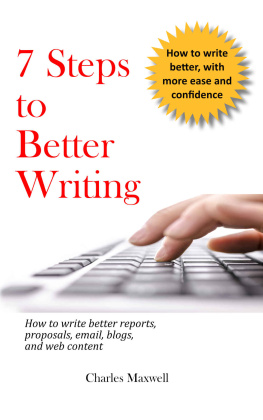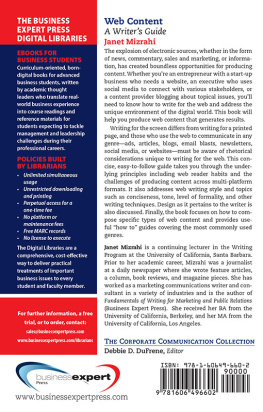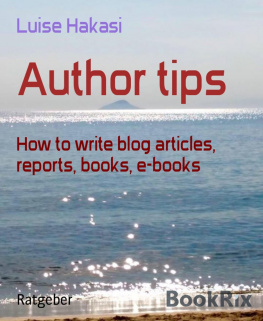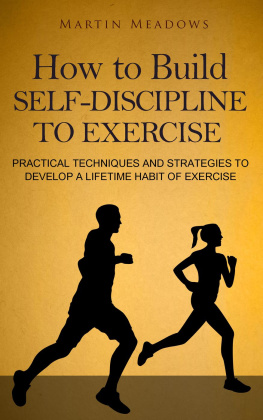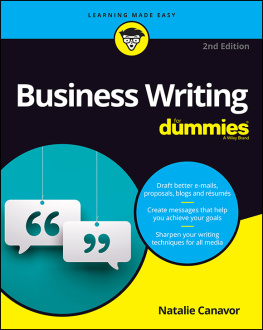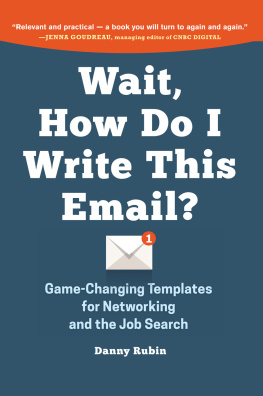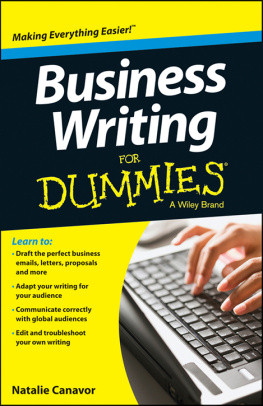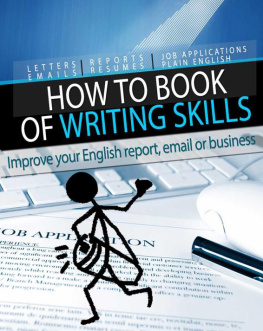7 Steps
to
Better
Writing
How to write better reports, proposals,
email, blogs, and web content
Charles Maxwell
T owering S kills LLC
Copyright 2020 by Towering Skills LLC
All rights reserved. No part of this book may be reproduced, distributed, transmitted, or stored in whole or in part in any form or by any means without the written permission of the copyright owner, except by reviewers, who may quote brief excerpts.
Limit of Liability and Disclaimer of Warranty: While the author and publisher took great care preparing this book, and they believe the advice to be sound, they make no representations or warranties with respect to the accuracy, completeness, or efficacy of this work, and they disclaim any implied warranties of fitness for a particular purpose. The reader alone is responsible for the consequencesboth positive and negativeof applying the ideas conveyed by this book.
Kindle Edition 1.02
Published by
Towering Skills LLC, Queen Creek, Arizona
www.toweringskills.com
Paperback edition ISBN 978-1-7314-6488-0
Kindle edition ASIN B08HJYQW6W
Table of Contents
What You Will Learn
This book will help you write better, faster, and with more ease and confidence. The ability to write well is essential to your success.
Much of what we read today is poorly written. This seems to make it acceptable to disregard how you write. But this is not true. Poorly written documents are ignored, only partly read, or misunderstood.
You know this. Your email inbox is full of unwanted and irrelevant sales copy. At your job, you are expected to read manuals, reports, and contracts that are long-winded and impenetrable. It is slow reading and hard thinking. And there is a lot of it.
This type of material brings with it mental discomfort every time you have to engage with it. The fog causes lost productivity, lost support, and lost sales.
Moreover, if what other people write is so bad, what can you say about your own writing? Is it more of the same? A murky miasma?
What if it were clear, concise, and engaging? What could you accomplish if what you wrote stood out like a brilliant neon sign in a dark night?
If what you write is not as succinct and engrossing as you would like, then this book is for you. This slim volume will show you how to capture and keep the attention of your readers. It will deliver the insights you need to write with skill.
This book is the outgrowth of my own long journey to improve my writing as an engineer, analyst, manager, and ghostwriter. A dozen years ago, I assembled what I had learned into a short course and coaching practice. That work eventually resulted in this book. People with decades of professional experienceas well as those just out of high school and collegehave benefited by learning and using the principles shared here.
If you use my 7-step writing process, I know your writing will improve. You will be able to:
- Capture the attention of your readers
- Save time collecting the facts needed to support your writing projects
- Frame your thoughts quickly
- Develop convincing arguments
- Compose with speed
- Cut out the fat that keeps people from reading your material
- Produce engaging documents that achieve results
- Be more confident
Furthermore, you will learn how to leverage the latest electronic technology to do more with less effort. Be assuredthere is a lot more to this than spelling and grammar checking.
One other point. This book covers 99% of what you need to know to write well, yet the book has less than 40,000 words. There is no other resource this comprehensive and concise.
Applying these principles will help you write with brevity, clarity, efficacy, and power.
Lets get started.
Good Writing Is Important
Effective writing drives the success of individuals and organizations. Well-written documents achieve better results and save time. Some experts estimate that poor writing costs the US economy $400 billion each year. Given this information, the annual global cost of poor writing surely tops $1 trillion.
But, poor writing does more than waste money. It also fosters misunderstanding, damages relationships, and wastes human potential.
While most people are unconcerned about the aggregate loss, we each are acutely aware of our own disappointments and pain. Sales are lost by poorly written proposals and ineffective sales copy. Careers are stunted by weak writing skills. In addition, all of us have been frustrated by confusing instructions and angered by harsh internet posts and insensitive emails.

Tom Peters says, The quality of written communication is still incredibly important. Work on your writing. It is a timeless and powerful skill. )
Good writers in business, government, technology, the sciences, education, sports, the arts, religion, and charities know they need to understand their audience and customize their messages to specific interests. They work to understand their readers needs, to deliver useful information, and to motivate action.
Documents Are the Bridges We Build to Convey Our Thoughts
Like builders needing to construct bridges to cross rivers, writers face the challenge of spanning gulfs of misunderstanding and ignorance. The documents they create are bridges to knowledge and trust.
Bridges are designed before they are built. Engineers first think through what will work best for each location and transportation need. Similarly, writers must determine what ideas are required for each situation and how to express those thoughts. Often, writers discover how to state an idea only by venturing forth with a rough draft, revising it many timesstriving, at each step, to be concrete, brief, and fair, and only then gradually articulating elusive thoughts. As writers labor to make their ideas clear, their messages take form like the steel and concrete spanning out across deep water. In this way, clear writing becomes clear thinkingwith clarity abiding both in the writer and in readers.

Abraham Lincoln was an effective writer who planned his compositions and thoroughly revised his work. ( )
Consider Abraham Lincoln. He spent much effort drafting and editing the Gettysburg Address, which includes only 270 words. He was concerned about the national audiencenot just those who would gather on 19 November 1863 at a new cemetery in Pennsylvania. He knew that journalists would latch on to his words and that millions of newspaper-reading citizens would reflect on his remarks.
Lincoln wanted his words to serve for more than a personal comment on the days program. He hoped to comfort those who had lost family and friends. Furthermore, he sought to persuade the nation to continue to make the sacrifices required to win the war and to reunite the nation.
Being thus highly motivated, he worked hard to determine what to say and how to say it. His effort was not wasted. Indeed, his words continue to stir the hearts of people throughout the world.
Your writing too can create bridges of understanding and persuasion.
Clear Writing Improves Thinking
Marvin H. Swift, a professor at the General Motors Institute at Flint, Michigan, in an article for Harvard Business Review , showed the link between writing and thinking. Swift described a manager upset because many employees were using the companys copy machine for personal matters, income tax forms, church programs, childrens term papers, and more.

